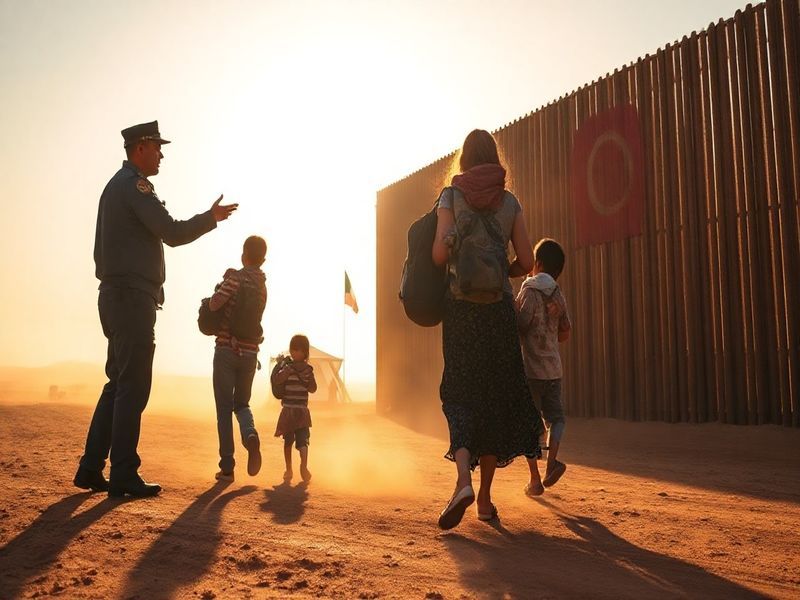The Great Global Shuffle: How Immigration Became the World’s Favorite Guilty Pleasure
Papers, Please: The world’s favorite new pastime is watching other people move
Dateline: Somewhere between the Mediterranean’s floating graveyard and the Rio Grande’s TikTok livestream—take your pick, both have Wi-Fi and existential dread in equal measure.
This week, immigration is once again the planet’s most lucrative spectator sport. From the Channel Tunnel to the Darién Gap, humanity is reenacting the 21st-century version of the Oregon Trail, only with more drones, fewer oxen, and roughly the same mortality rate. Governments, having perfected the art of expressing “deep concern” while cashing in on remittances, are now competing to see who can build the shiniest fence with the darkest backstory.
The European Union, still pretending it’s shocked that people flee wars it helped export, has unveiled Operation Asphyxiate—sorry, “Asphyx” (branding is everything). The plan involves paying Tunisia to intercept boats before they reach Malta, a fiscal arrangement reminiscent of medieval indulgences, but with better PowerPoint. Meanwhile, Italy’s far-right government, fresh off a campaign that promised to “defend Christian Europe,” has discovered that its aging population needs actual humans to keep the espresso machines running. Divine comedy, thy name is demography.
Across the Atlantic, the United States Supreme Court ruled that states can arrest anyone who “looks removable,” a legal standard as precise as a horoscope and twice as dangerous. Texas promptly ordered enough razor wire to gift-wrap the entire state, while New York City—whose mayor recently asked residents to “open their hearts and spare bedrooms”—quietly converted luxury hotels into intake centers. Nothing says “American dream” like a $3,000-a-night suite now housing a family of eight who just trekked 2,000 miles to scrub your Uber Eats dishes.
Canada, determined to maintain its polite reputation, announced it will accept 500,000 new permanent residents annually, then acted surprised when rental listings in Toronto began resembling eBay auctions for kidneys. Australia, not to be outdone, expanded its “No Way” policy to include a points-based visa for millionaires fleeing tax audits back home. Apparently, drowning is only tragic if you’re poor.
The Gulf states, having long outsourced their entire existence to migrants they refuse to naturalize, are now marketing “golden visas” for influencers who promise to post camel selfies. In Southeast Asia, Thailand proposed a $27,000 “digital nomad” package—roughly the annual income of the Burmese refugees stuck in border camps just a few kilometers away. The algorithm, like God, works in mysterious yet deeply monetized ways.
Global implications? Start with the $700 billion in remittances sloshing around annually—money that keeps entire economies afloat while allowing rich countries to pretend they’re not colonial ATMs. Add the demographic cliff: by 2050, one in six people on Earth will be over 65, which means someone has to change the bedpans, and robots still can’t fold hospital corners. Finally, sprinkle in climate displacement—conservative estimates say 216 million internal migrants by 2050, a figure that sounds like a UN typo until you realize it’s just Tuesday in Bangladesh.
The broader significance is that borders have become the last religion where everyone still believes. Rich nations preach free markets, then act shocked when labor behaves like any other commodity—flowing toward demand. Poor nations export their youth like lithium, then wonder why the villages are empty except for grandmothers and political billboards. Meanwhile, smugglers—the only entrepreneurs truly free of regulation—report record profits. Venture capital, take notes.
Humanity’s newest export isn’t culture or technology; it’s desperation wrapped in official paperwork. And the receiving countries, clutching their demographic spreadsheets like holy relics, have convinced themselves the problem is a lack of walls rather than a surplus of inequality. As the saying almost goes: give me your tired, your poor, your huddled masses—then slap a processing fee on them and call it sovereignty.
Conclusion? We’re all migrants now; some just haven’t left yet. The rest are stuck in the departure lounge, watching the in-flight safety video narrated by a customs officer who’s never missed a meal. Fasten your seatbelts—it’s going to be a bumpy century.







